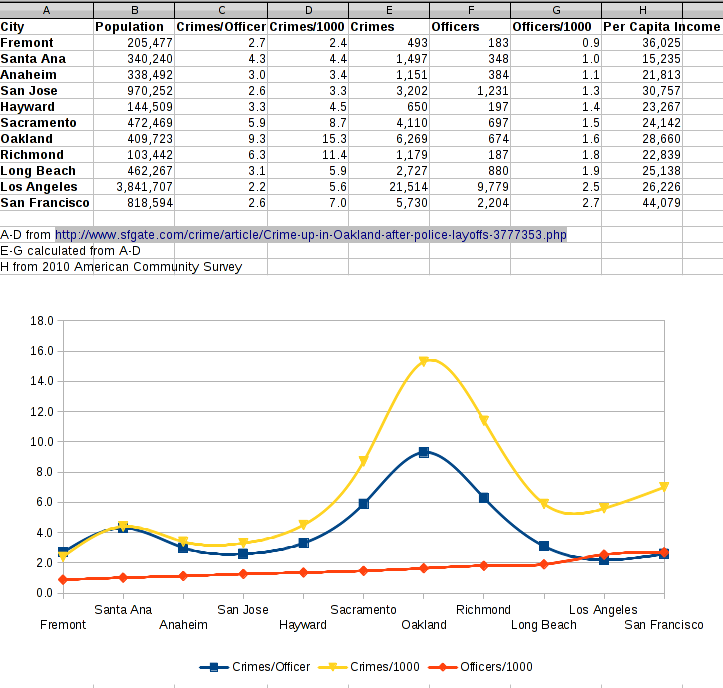I read the websites of candidates for Oakland City Council District 1 (North Oakland), City Council At-Large, and City Attorney. With only a few exceptions, each can be compressed with no loss of information to “I ♥ Oakland. Crime sucks.” That does capture the sentiments expressed on t-shirts worn by hipsters and voiced by people who attend neighborhood meetings. But why bother running for office without additional substance? I’m insulted by the vacuity of most of the candidates.
Among the sorry lot, there’s a clear winner for each office. Vote for Len Raphael (District 1), Rebecca Kaplan (At-Large), and Barbara Parker (Attorney). Below I rank and make fun of the candidates for each of the offices.
District 1 (North Oakland)
1st) Len Raphael has the most extensive issues pages of any candidate, and he’s left at least hundreds of comments on various news sites (e.g., East Bay Express). Raphael wants more and better city government and has a sadly novel (it shouldn’t be novel) plan to pay for it — pay new city employees less. Also, while it isn’t a big deal in the grand scheme of things, I’m happy to see Raphael write “Spending money on economic development consultants and staff and promotion is mostly a waste.”
2nd) Don Macleay, a Green, is the only other district 1 candidate that has taken the time to state his position on any issues of substance. It seems he’s not part of the establishment, and from the headlines I’ve scanned Green officeholders are doing a decent job of running the nearby city of Richmond.
3rd) Dan Kalb has an issues page and promises position papers. Yes, it’s a low bar.
Honorable mention to Craig Brandt, who writes about substantial issues on his site, but sadly his proposals are rather empty, e.g., on police: “I am proposing that we begin lobbying the State to pay for the training of police officers.” Even before taking office a program reliant on (and thus able to place blame on) higher levels of government is distinctly worrying. Besides, Oakland’s two previous mayors were relative political superpowers, and their lobbying for state and federal assistance led to long term improvements in governance, right? Sure.
The following candidates should be disqualified for having nothing to say.
Richard believes the city is two or three projects away from becoming a world-class center of commerce.
…
Richard’s campaign is about saving lives and helping our city become all that it can be. In order to get there, the city’s government has to become more responsive to local business—and more accountable to residents. Only working together can Oakland create more jobs, better schools, and less crime.Richard’s personal experience and his years of leadership in local government have given him the tools to help Oakland achieve this historic transformation. Running for City Council is a chance to stand up for what he believes in—and to help usher in a new generation of leadership to the city…one that’s focused on bringing people together to solve Oakland’s problems.
Don has a vision for Oakland, a vision with quiet, safe neighborhoods, vibrant, exciting commercial districts and an education system that keeps our kids in school, prepares them for college or for good jobs when they graduate.
Oakland already has the location, the climate, the people, and the potential to be a phenomenal city. The NY Times recognized this; those of us who live and work here also know this to be true. There are challenges that hold our city back, as Council member for District 1, Don will make sure we can solve those challenges, bring real solutions to the table and move Oakland forward.
North Oakland is a wonderful place to live.
There is so much to love, from our vibrant neighborhoods and fantastic neighbors to our unique local merchants and award-winning restaurants.Yet I know there is so much that could be improved.
Like you, I want the basics: safe, clean streets, good schools, and a healthy economy that benefits all Oaklanders. All of these things are within our grasp. I know, working together, we can reach them.As your Councilmember, I will focus on the core responsibilities of city government and tackle our challenges with creativity, persistence and pragmatism. I value collaboration and civility working with colleagues, and transparency and participation when working with the public.
At-large
1st) Rebecca Kaplan, the incumbent, has an OK issues page and I rank her first for the same reason I ranked her first for mayor: the other candidates are embarrassments.
2nd) Carol Lee Tolbert doesn’t really say anything of substance, for example: “Allowing Oakland to be the most dangerous city in California is unacceptable.” I rank her on the basis of her statement “I have served the citizens of Oakland on the Oakland School Board. I took the District out of State Receivership, left it with a $10 million surplus in 1997, and created quality neighborhood schools.” If this is an accurate description of her contribution as a school board member, it seems like highly relevant experience.
3rd) Mick Storm at least realizes that something is amiss, but he really ought to have an inkling beyond that before running:
As I look at the statements and positions of the incumbent council, I find little I disagree with. My only question is, why has so little been accomplished?
Theresa Anderson-Downs is another Green candidate, who doesn’t seem to have a website. I found an announcement of her candidacy which doesn’t say much.
Ignacio De La Fuente is incumbent in District 5, a seat he is not defending in order to run for At-large. He has a web site that doesn’t mention the current race. He’s a political dinosaur that should have been run out of town long ago for saddling Oakland with millions and decades of debt to lure the owners of the Raiders football team back to Oakland.
Attorney
Incumbent Barbara Parker has an OK issues page. Jane Brunner (incumbent District 1 city councilperson) would be at home with most of the candidates for her seat: she loves Oakland. I agree with Make Oakland Better Now’s endorsement of Parker. Seeing them debate recently reinforced my impression of each: Parker is a professional, Brunner a politician, with competence and capriciousness allocated between them as one would expect.


